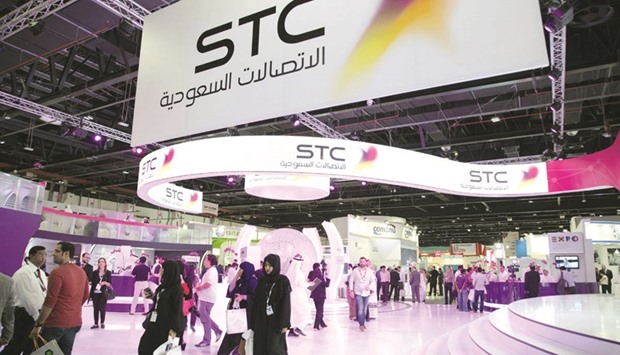Shares in Saudi Telecom Co (STC), the kingdom’s largest telecommunications operator, tumbled as much as 8.5% yesterday as investors feared it could lose market share because of government plans to foster more competition.
As part of economic reforms to cut Saudi Arabia’s dependence on oil, the government will provide operators with “unified licences” allowing them to offer a full range of telecommunications services, the Capital Market Authority (CMA) said on Sunday.
Telecommunications analysts said this represented a major shake-up of the industry — and that there might be losers as well as winners.
Previously, operators had to apply for separate licences to offer services such as mobile and fixed-line.
Now they will need only a single licence, making it easier for firms to challenge STC, the main operator of fixed-line services, said Nishit Lakhotia, head of research at Securities & Investment Co.
In particular, Zain Saudi Arabia and Etihad Etisalat (Mobily), an affiliate of the United Arab Emirates’ Etisalat, which now mainly operate in the mobile market, will be able to expand into fixed services, he said.
“STC should get ready for competition in the fixed-line business. For consumers, this should provide more options and kinds of services and better prices.”
The economic reform plan includes goals such as stimulating investment in broadband by telecommunications providers and doubling the contribution of the information technology industry to non-oil gross domestic product to 2.24% by 2020.
The CMA’s statement did not give details of the new licences or say when they would be awarded, and officials of the Communications and Information Technology Commission could not be contacted to comment.
STC, a former monopoly, issued a brief statement saying the licensing changes would give it and other operators opportunities to grow, but added that it was too early to determine the financial impact.
Shares in Saudi Arabia’s three other listed telecommunications firms were suspended pending their statements on the reform.
Zain said the unified licences would enable it “to offer all telecommunication services, including fixed services”, while Mobily said they would improve its positioning in the market; neither company elaborated.
Lakhotia said the new policy could also be positive for the smallest operator, Atheeb Telecommunication Co, which currently operates mainly in the fixed-line business and might now be able to launch mobile services.
The CMA said the commission would extend licensing periods for the companies by 15 years, in exchange for 5% of each company’s annual net income during the extension period.
Zain Saudi said the extension would reduce its annual amortisation charge by 433mn riyals ($115.4mn), while Mobily predicted a positive annual impact of up to 260mn riyals and Atheeb estimated an annual savings of 9.7mn riyals.
However, Lakhotia said he understood the extensions would only begin to take effect when the companies’ current licence periods expired, in 2028 for STC, 2033 for Zain Saudi and 2029 for Mobily.

STC has issued a statement saying the licensing changes would give it and other operators opportunities to grow, but added that it was too early to determine the financial impact.
